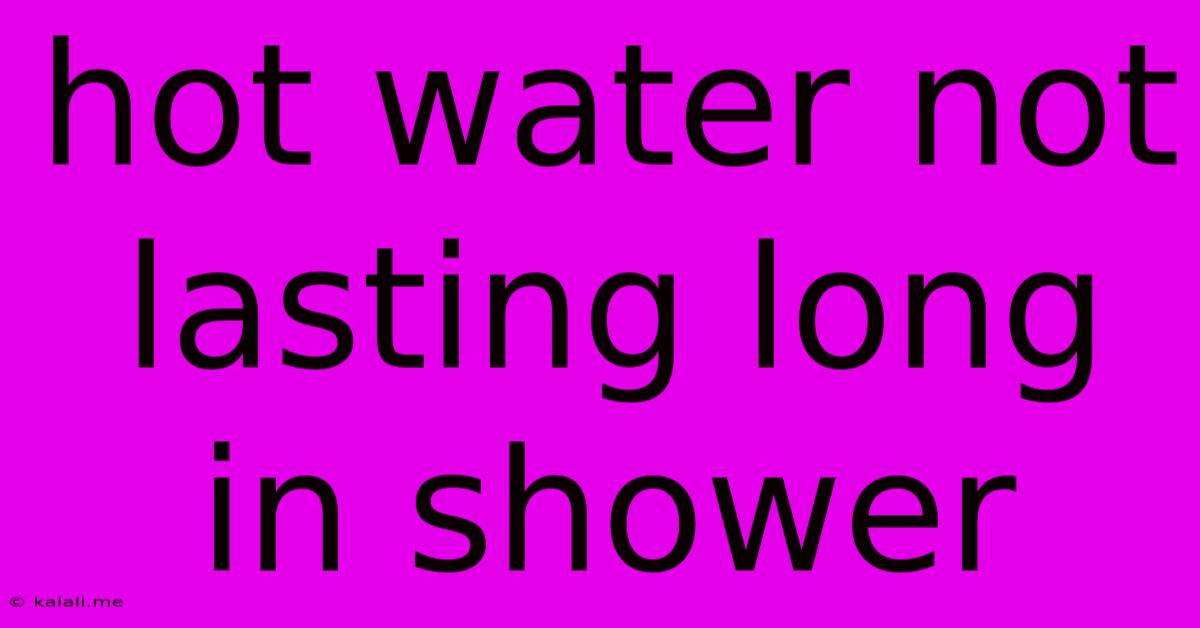Hot Water Not Lasting Long In Shower
Kalali
Jun 03, 2025 · 3 min read

Table of Contents
Hot Water Not Lasting Long in Shower? Here's Why and How to Fix It
Meta Description: Frustrated with short, lukewarm showers? This guide diagnoses common causes of low hot water supply, from simple fixes like checking your water heater temperature to more complex plumbing issues. Learn how to troubleshoot and resolve the problem, ensuring consistently hot showers.
Are you tired of your blissful hot shower turning into a chilly disappointment mid-way through? A dwindling supply of hot water is a common household problem, but thankfully, it's often solvable. This article will delve into the various reasons why your hot water might be disappearing faster than you'd like, and offer practical solutions to help you reclaim those long, luxurious showers.
Common Causes of Low Hot Water Supply
Several factors can contribute to your hot water running out prematurely. Let's examine the most frequent culprits:
-
Low Water Heater Temperature: This is the most common and easiest fix. Your water heater may simply not be set to a high enough temperature. Check the thermostat and adjust it to a higher setting, typically between 120-140°F (49-60°C). Remember to wait for the water to reheat before testing.
-
Sediment Buildup in Water Heater: Over time, minerals in your water can accumulate at the bottom of your water heater, reducing its efficiency and capacity. This sediment acts as insulation, hindering the heating process. Regular flushing of your water heater can significantly improve its performance. You can find tutorials online on how to flush your water heater safely and effectively based on your specific model.
-
Leaky Faucets or Fixtures: Dripping faucets and leaky showerheads contribute to a higher water consumption rate, thus depleting your hot water supply faster. Repairing these leaks is not only crucial for conserving water and money but also for preserving your hot water supply.
-
Multiple Hot Water Appliances Running Simultaneously: Using multiple hot water-dependent appliances, such as a washing machine, dishwasher, and shower concurrently, can quickly exhaust your hot water tank's capacity. Consider staggering the use of these appliances to avoid this issue.
-
Insufficient Water Heater Tank Size: If your household has many people or uses a significant amount of hot water daily, your current water heater tank size may be too small. Upgrading to a larger capacity tank might be necessary to meet the demand.
-
Plumbing Issues: In some cases, low hot water pressure could point to a more complex plumbing problem. This might involve issues with pipe sizing, blockages, or even a problem with the water heater itself. In this instance, contacting a qualified plumber is recommended.
Troubleshooting Steps
Before calling a plumber, try these troubleshooting steps:
- Check the Water Heater Temperature: This is the easiest and fastest solution.
- Inspect Faucets and Showerheads for Leaks: Repair or replace any leaking fixtures.
- Listen for Unusual Noises: Gurgling or banging sounds from your water heater could indicate sediment buildup or other issues requiring professional attention.
- Check Water Pressure: Low water pressure throughout your house can indicate a more serious plumbing problem.
- Observe Water Heater's Recovery Time: Time how long it takes your water heater to reheat after a hot shower. A very long recovery time suggests inefficiency or potential problems.
When to Call a Plumber
While many problems can be solved with simple DIY fixes, some require the expertise of a qualified plumber. Contact a professional if:
- You suspect a significant plumbing issue.
- Your water heater is leaking.
- You've tried the troubleshooting steps, but the problem persists.
- You're unsure about any aspect of repairing or maintaining your water heater.
By systematically investigating these potential causes and taking appropriate action, you can diagnose the root of your short hot shower problem and enjoy consistently hot water for your daily showers. Remember to prioritize safety and call a professional when necessary.
Latest Posts
Latest Posts
-
What Happens If You Receive Someone Elses Package
Jun 05, 2025
-
No Hot Water In Bathroom But Everywhere Else
Jun 05, 2025
-
Can You Ride A Bike On Shabbat
Jun 05, 2025
-
Sed Append To End Of Line
Jun 05, 2025
-
Seal Around Pipe In Concrete Wall
Jun 05, 2025
Related Post
Thank you for visiting our website which covers about Hot Water Not Lasting Long In Shower . We hope the information provided has been useful to you. Feel free to contact us if you have any questions or need further assistance. See you next time and don't miss to bookmark.